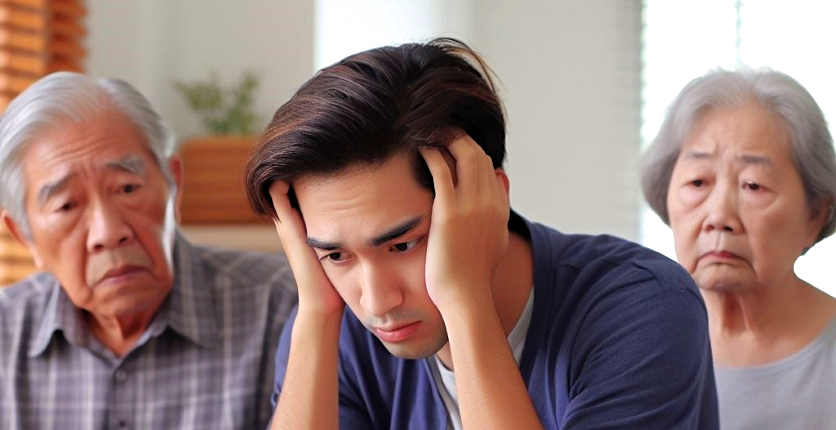Depression isn’t contagious, but if you live with, care for, or love someone with depression, their condition can take a toll on you, too.
World Mental Health Day, which falls on 10 October every year, aims to drive positive change for everyone’s mental health. This year’s theme is “Mental health is a universal human right”, so if you support someone with depression, this is a good time to ask yourself if you’re experiencing what’s known as “caregiver burnout” or “caregiver stress”, and to find ways to take care of your own mental health while still being there for your loved one with depression.
What is caregiver burnout?

For starters, it’s important to educate yourself and to be aware of how depression impacts your loved one, says Michelle Png, Assistant Senior Counsellor at Care Corner Counselling Centre.
“Look out for symptoms such as persistent depressive moods, a lack of interest in things that they usually find pleasurable, chronic fatigue, sleeping too much or too little, a retardation of psychomotor skills, and expressions of suicide ideation and even suicide attempts, depending on the person.
“Caregivers may experience some of these same symptoms, too, for example, feelings of sadness, irritability, anxiety, helplessness, and constant worrying.
“The mundane task of providing functional support, such as coordinating medical appointments, managing medications, assisting with personal hygiene, and handling financial or administrative matters may add to your psychological load. Oftentimes, carers also have other important commitments, such as work, parenting and studies to attend to.”
Michelle explains that the physical, emotional and psychological burden can get overwhelming if you don’t practise self-care and especially if you don’t have other family members or friends to share the load with.
Challenges faced by caregivers

Not everyone who’s depressed exhibits the same symptoms, which is why no two caregivers experience the same challenges, Michelle points out.
For instance, some people with depression are able to mask their condition and carry out their day-to-day tasks with some level of efficacy, and instead of expressing sadness or a low mood, they may be irritable and exhibit mood swings or rage. Living with a depressed loved one who appears to function normally but is hypersensitive to triggers can be frightening, and the caregiver might feel like they have to walk on eggshells around this person just to keep the peace at home.
Sometimes, a depressed person may seem like a complete stranger to their spouse. They may struggle to hold a normal conversation or even carry out basic tasks, such as eating and bathing. Their spouse may be resentful towards them and feel frustrated at having to act like their parent and do everything for them.
If your depressed loved one self-harms or attempts suicide, you may also feel traumatised and helpless.
“Sometimes, carers experience compassion fatigue,” Michelle adds.
“The depressed person might feel angry and resentful towards their caregiver. The carer feels overwhelmed and may react harshly or aggressively, causing their depressed loved one to feel worse and to display even more depressive symptoms. This in turn may cause the carer to feel guilty. When such a cycle is perpetuated, it can cause the carer to feel emotionally exhausted.”
Find out more about the mental health issues that are common in men and how to manage them.
How caregivers can protect their mental health

Wanting to help your depressed loved one through their episodes is a good thing, but you can’t give what you don’t have. This is why you should prioritise self-care and exercise self-compassion. This involves eating healthily, exercising, getting enough sleep, and learning how to manage stress. You should also create your own support system and ask for help in tangible ways, such as with child-minding or cooking, and intangible ways, such as with emotional support.
Some carers also find comfort in their faith or spiritual practice. Michelle says that this may take the form of meditation, prayer or attending a religious service.
When you take care of your own mental health, you’ll find it easier to manage feelings of sadness, anger and helplessness and look after your depressed loved one with patience and compassion.
“When you are gentle with yourself and permit yourself to feel and share vulnerable emotions, such as helplessness, and are open to receiving consolation from others, you become more compassionate; you are able to hold space for your depressed loved one”, Michelle explains.
“Instead of saying, ‘Let’s just be positive here’ or to repeat platitudes, you can validate them by saying, ‘This is so hard for you. I don’t know how to take the pain away but I’m here with you. I can be with you in your pain’.
What to do when caregiving feels unbearable

Sometimes, people who are depressed may lash out at their loved ones. This can be especially hurtful for the caregiver.
Michelle says that when you’re a “long-haul” carer, it’s essential that you learn to compartmentalise. Detaching yourself emotionally, taking a step back from your emotions and viewing the situation with objectivity, can be helpful. Just try to allow the difficult moments to pass.
“During such times, mindfulness exercises can help you stay centred and grounded,” she adds.
“You can practise self-awareness of your own triggers and choose not to react. When you feel attacked or hurt, you can allow yourself to feel those emotions without judging yourself. Breathe deeply to allow your brain to soothe your nervous system and regulate your heart rate.”
You should also remind yourself that their hurtful words are not an evaluation of your self-worth or character, but rather, reflect your depressed loved one’s emotional wounds and pain.
Of course, sometimes, it can be hard to accept this. When your depressed friend, spouse or family member lashes out in anger, you may feel the need to confront them and force them to apologise or to admit accountability for their words, actions or behaviour.
“Your emotions are certainly valid, but you need to be mindful of how you approach your depressed loved one,” says Michelle.
“As painful and hurtful as it may feel, you have to expect that there will be moments when they’re incapable of understanding where you’re coming from. Their emotional wounds sometimes make it difficult for them to interpret your words in the way you’re trying to come across.
“This is why, when the task of caring for your depressed loved one feels overwhelming, it can be helpful to get the support of a mental health professional, someone who can help you process your feelings and experiences.”
Read more about how Traditional Chinese Medicine (TCM) may help alleviate some symptoms of anxiety and stress.
Care Corner Counselling Centre is one of the beneficiaries of this year’s SAFRA Swim For Hope. For the 13th edition this year, the event aims to show support to individuals who are recovering or suffering from mental health struggles and uplift their quality of life. Go to safras4h.sg to find out how you can contribute to the cause.
Want more articles like this, and other lifestyle content right in your inbox? Download the new SAFRA mobile app and opt in for the eNSman Newsletter – you don’t need to be a SAFRA member to subscribe – and never miss another story!







